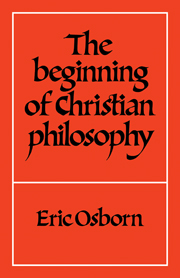Book contents
- Frontmatter
- Contents
- PREFACE
- REFERENCES
- ABBREVIATIONS
- 1 CHRISTIAN ARGUMENT
- 2 PEOPLE AND PLACES
- 3 THE GOD ABOVE
- 4 THE RATIONAL LAUGHING ANIMAL
- 5 COSMOS AND CREATION
- 6 HISTORY
- 7 THE SHORT WORD
- CONCLUSION
- APPENDIX
- BIBLIOGRAPHY
- INDEX OF BIBLICAL CITATIONS
- INDEX OF CITATIONS FROM ANCIENT AUTHORS
- INDEX OF CITATIONS FROM MODERN AUTHORS
- GENERAL INDEX
- Frontmatter
- Contents
- PREFACE
- REFERENCES
- ABBREVIATIONS
- 1 CHRISTIAN ARGUMENT
- 2 PEOPLE AND PLACES
- 3 THE GOD ABOVE
- 4 THE RATIONAL LAUGHING ANIMAL
- 5 COSMOS AND CREATION
- 6 HISTORY
- 7 THE SHORT WORD
- CONCLUSION
- APPENDIX
- BIBLIOGRAPHY
- INDEX OF BIBLICAL CITATIONS
- INDEX OF CITATIONS FROM ANCIENT AUTHORS
- INDEX OF CITATIONS FROM MODERN AUTHORS
- GENERAL INDEX
Summary
Alternative methods in the history of ideas in the patristic period
Our five different questions and methods spring from a scheme that is based on three main types, with subdivisions in the third. The first method is polemical: ‘Does it make sense?’ ‘Is it true?’; and regards past writers as contributors to unchanging problems: ‘by noticing the strong and weak points of each theory we can discover the direction in which further progress may be made’. The systematic theologian commonly approaches the early centuries with similar direct questions:
‘We must raise questions about the truth and falsity of the arguments used in that process and the results achieved by it. And this we can only do from one position and with one set of criteria: that is, from the position of our contemporary world and with the criteria that seem to us appropriate to the subject-matter under review.’
There is an attractive freshness about this approach; for more than a thousand years the fathers had been cited in short authoritative passages. Theology had so often been built upon catenae that could not be questioned because they were so close in time to the sources of Christianity. For example, questions of Church order and Roman primacy were argued with extracts from Ignatius, Irenaeus, Cyprian and others. Ascetical theology followed a similar pattern. Just as the biblicist cited his proof-texts from the Bible, so the patristic scholar found his proof-texts in the fathers.
- Type
- Chapter
- Information
- The Beginning of Christian Philosophy , pp. 273 - 288Publisher: Cambridge University PressPrint publication year: 1981



